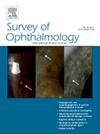Effects of medications on the human electroretinogram: A comprehensive review
IF 5.9
2区 医学
Q1 OPHTHALMOLOGY
引用次数: 0
Abstract
The electroretinogram (ERG) is a well-established method to investigate retinal function and can often provide critical diagnostic information for underlying retinal disorders. ERG responses rely on the neuronal activity of retinal cells which, like neurons elsewhere, are subject to perturbation by a wide spectrum of neuromodulating substances. These agents have the potential to confound electrophysiologic recordings used to evaluate visual function. We provide a comprehensive literature review of studies that have examined the impact of pharmacologic agents on human electrophysiologic testing of retinal function. This review is focused primarily on full-field ERG data, but also includes a limited number of studies examining effects of medications on pattern ERG and visual evoked potential recordings. The studies reviewed are categorized by medication class and evidence level according to the strength of the supporting data; for example, some included studies have a lower evidence level because they included a small number of subjects or did not use international electrophysiology testing standards. We identified numerous widely-used medications and some recreational substances that have been shown to alter ERG responses, underscoring the need to take a complete medical and medication history for each patient undergoing ERG testing.
药物对人视网膜电图的影响:一项全面的综述。
视网膜电图(ERG)是一种成熟的研究视网膜功能的方法,通常可以为潜在的视网膜疾病提供关键的诊断信息。ERG反应依赖于视网膜细胞的神经元活动,像其他地方的神经元一样,视网膜细胞受到广泛的神经调节物质的干扰。这些药物有可能混淆用于评估视觉功能的电生理记录。我们提供了一个全面的文献综述的研究,已经检查了药物对视网膜功能的人体电生理测试的影响。本综述主要集中在全视野电图数据,但也包括有限数量的研究,检查药物对模式电图和视觉诱发电位记录的影响。回顾的研究根据支持数据的强度按药物类别和证据水平分类;例如,一些纳入的研究证据水平较低,因为它们纳入的受试者数量较少或未使用国际电生理测试标准。我们发现许多广泛使用的药物和一些娱乐性物质已被证明可以改变ERG反应,强调需要对每个接受ERG测试的患者进行完整的医疗和用药史。
本文章由计算机程序翻译,如有差异,请以英文原文为准。
求助全文
约1分钟内获得全文
求助全文
来源期刊

Survey of ophthalmology
医学-眼科学
CiteScore
10.30
自引率
2.00%
发文量
138
审稿时长
14.8 weeks
期刊介绍:
Survey of Ophthalmology is a clinically oriented review journal designed to keep ophthalmologists up to date. Comprehensive major review articles, written by experts and stringently refereed, integrate the literature on subjects selected for their clinical importance. Survey also includes feature articles, section reviews, book reviews, and abstracts.
 求助内容:
求助内容: 应助结果提醒方式:
应助结果提醒方式:


